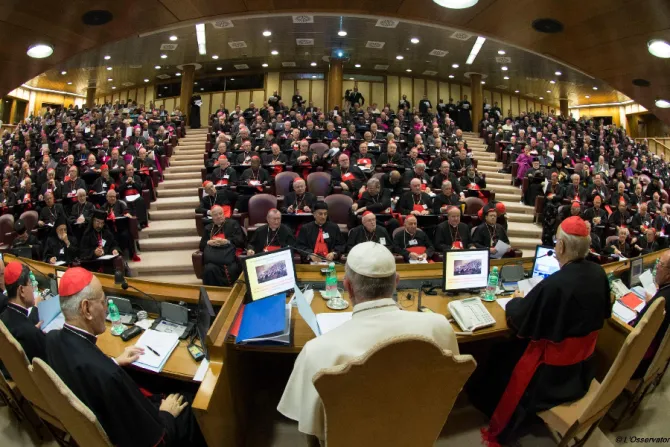he opening of the Synod for the Family at the Vatican on Oct. 5, 2015. | Vatican Media.
The Vatican acknowledged yesterday that the Church’s effort to listen to the 1.34 billion Catholics worldwide through a synodal process is facing challenges.
“Many of the faithful perceive the synodal process as a crucial moment in the Church’s life, as a learning process, as well as an opportunity for conversion and renewal of ecclesial life,” said a Feb. 7 statement following a meeting of the ordinary council of the Synod of Bishops on Jan. 26.
“At the same time, various difficulties have also emerged. In fact, fears and reticence are reported among some groups of the faithful and among the clergy. There is also a certain distrust among the laity who doubt that their contribution will really be taken into consideration.”
The statement cited the pandemic as a further obstacle to gathering in person for communal discernment, underlining again that the local synodal process leading up to the 2023 Synod on Synodality “cannot be reduced to a mere questionnaire.”
But the organisers reported that, despite the challenges, participation among Catholic bishops’ conferences worldwide has been high and efforts have been made to translate the synod documents into many local languages.
According to the council, “close to 98% of the Episcopal Conferences and Synods of Eastern Churches worldwide have appointed a person or an entire team to implement the synodal process.”
“The synodal process has been particularly welcomed with joy and enthusiasm in several African, Latin American, and Asian countries,” it said.
The statement outlined five “recurring challenges” facing the current diocesan phase of the synod.
1) Formation “in listening and discernment” is needed to ensure that the synod remains a spiritual process.
2) There is a temptation to be “self-referential” in group meetings rather than being open to others.
3) Getting young people to participate is a challenge.
4) Reaching out to and involving “those who live on the margins of ecclesial institutions” can be difficult.
5) Some clergy are reluctant to participate.
“There is a growing awareness that the synodal conversion to which all the baptised are called is a lengthy process that will prolong itself well beyond 2023,” the Vatican statement said.
“The desire all over the world is this synodal journey which has begun at the local level continue this journey well beyond Synod 2021-2023 so that tangible signs of synodality might increasingly be manifest as constitutive of the Church.”
The statement also announced that the Vatican would send a note to dioceses and bishops’ conferences with further details on how to format reports on the local consultation, which will be sent to the General Secretariat of the Synod of Bishops.
“The note proposes the idea that the drafting of the report is itself an act of discernment, i.e. the fruit of a spiritual process and teamwork,” it said.
The synodal process is a global, two-year event featuring “listening and dialogue” that Pope Francis formally launched in October 2021. The first stage is a diocesan phase expected to last until Aug. 15.
The Vatican has asked all dioceses to participate, hold consultations, and collect feedback on specific questions laid out in synod documents. At the end of the current process, an assembly of the Synod of Bishops is scheduled to take place in Rome in October 2023 to produce a final document to advise the pope.
The Synod of Bishops’ statement invited Catholics to read its weekly newsletter, as well as visit its website for prayers for the synod and synod resources page.
Source: CNA

